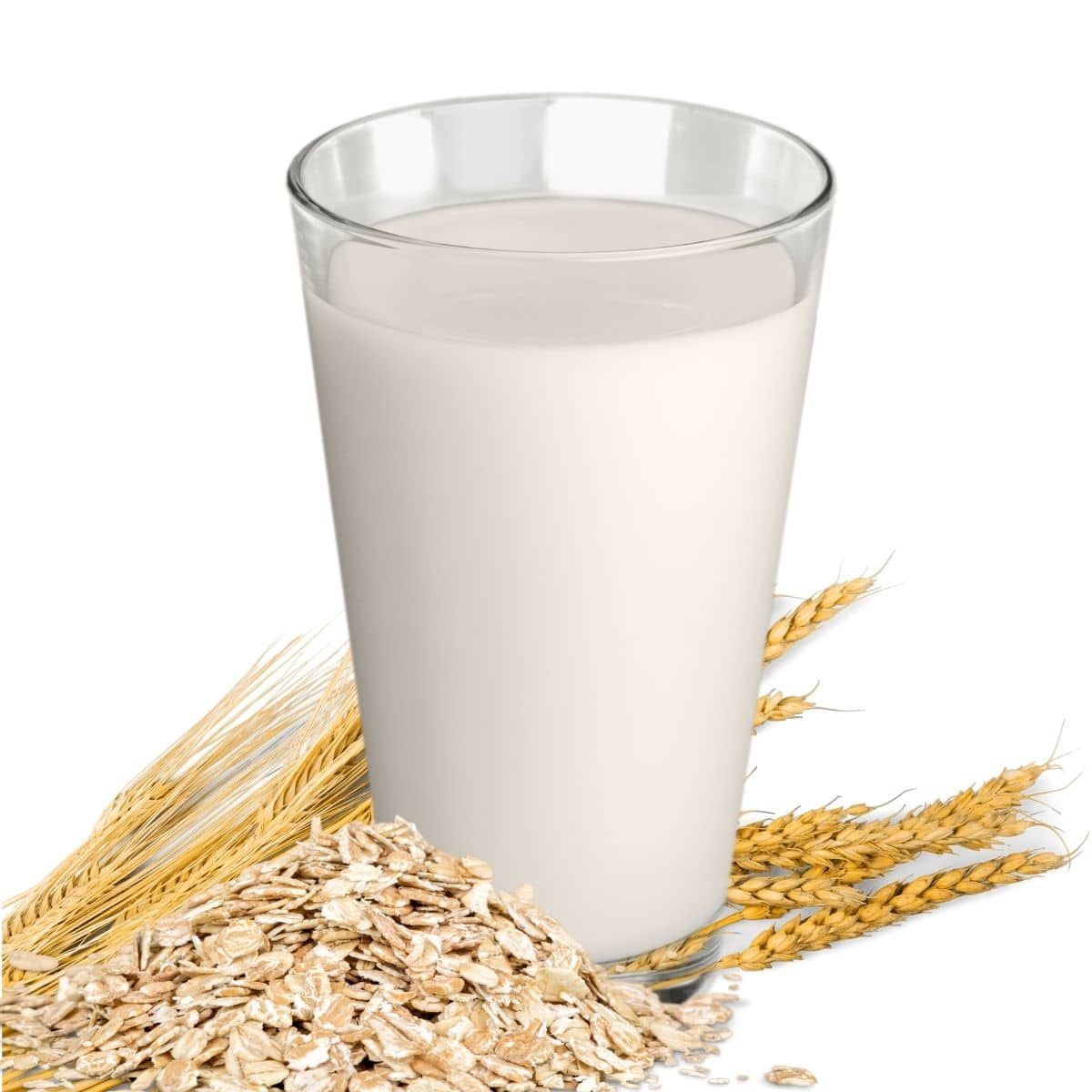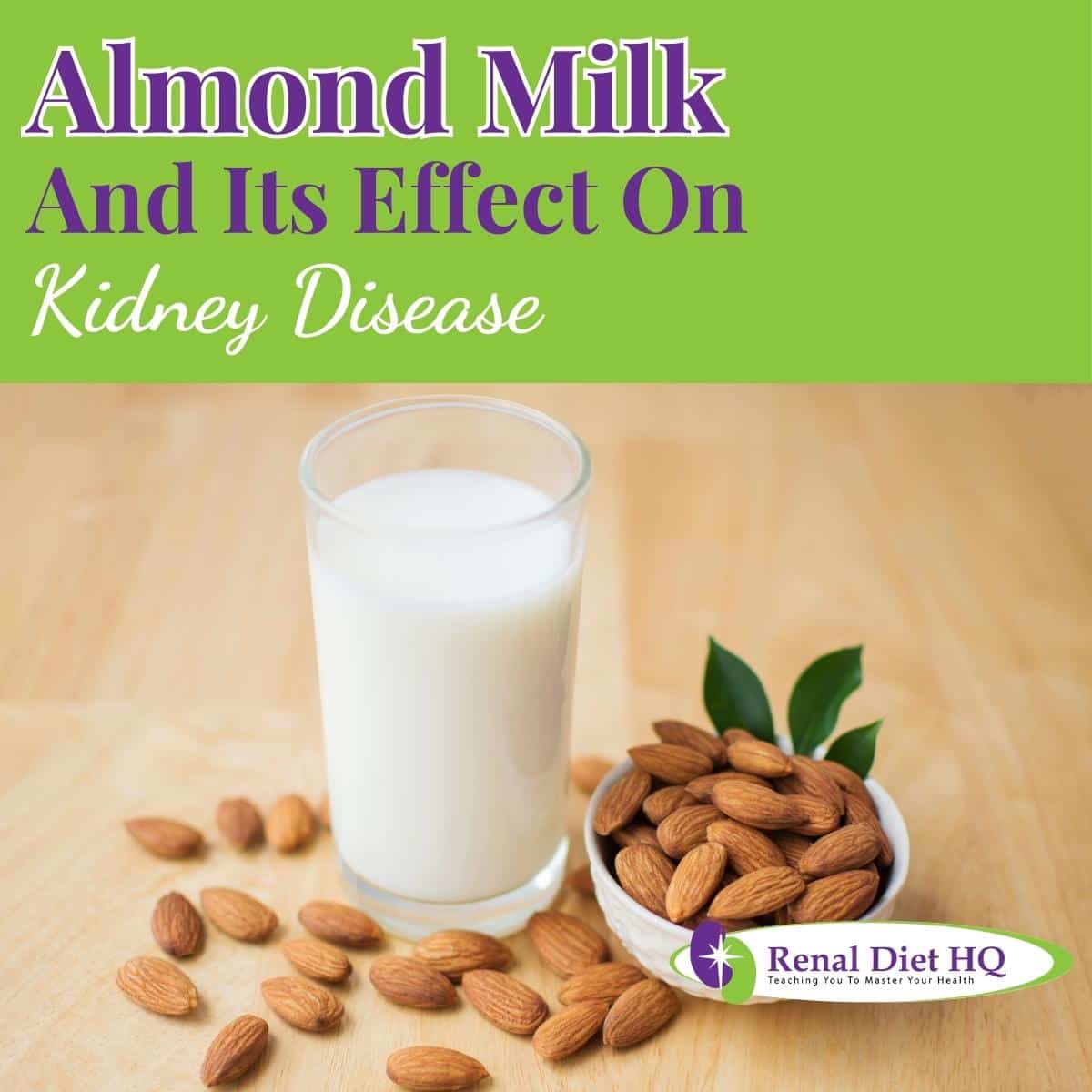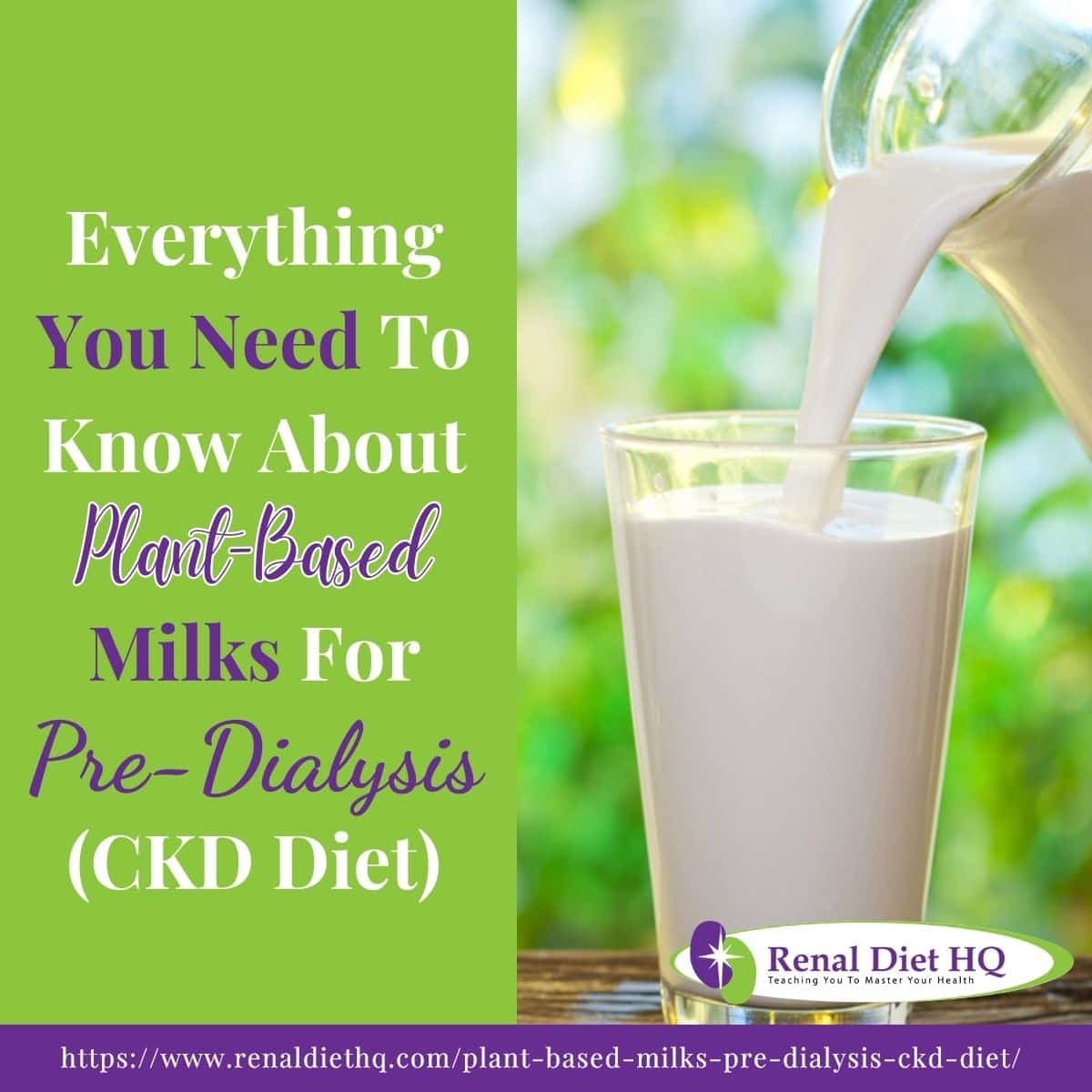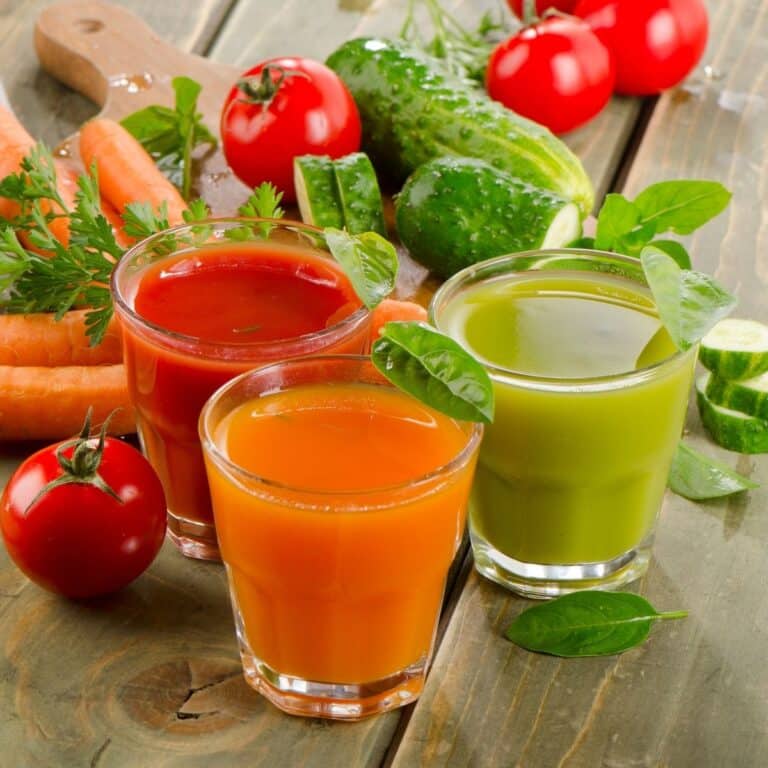Everything You Need To Know About Plant Based Milks For Pre-Dialysis (CKD Diet)
Are you wondering what plant-based milks are and if they’re a healthy option for those with pre-dialysis chronic kidney disease (CKD)? If so, you’ve come to the right place! This article will provide all the information you need to make an informed decision about incorporating plant based milks into your diet.

Plant based milks have become increasingly popular in recent years due to their health benefits and taste. They offer protein, vitamins, minerals, fiber, and other nutrients without containing any cholesterol or saturated fat. In addition, these milks don't contain lactose which can be difficult for those with CKD to digest.
Why do you need a pre-dialysis diet plan? For people living with pre-dialysis CKD it is essential that they find ways of maintaining adequate nutrition while limiting foods high in phosphorus and potassium.
Plant based milk can help them achieve this balance by providing many important nutrients without adding unnecessary phosphorus or potassium levels. Let’s explore everything there is to know about using plant based milk as part of a pre-dialysis CKD diet!
Jump to:
- Low Potassium Milk Alternatives
- Benefits Of Oat Milk For Kidney Disease
- Nutritional Values Of Oat Milk
- Almond Milk And Its Effect On Kidney Disease
- Is Soy Milk An Option For Kidney Patients?
- Unenriched Rice Milk: A Potential Alternative
- Is Coconut Milk Suitable For CKD Patients?
- What Plant-Based Milk Is Best For Pre-Dialysis CKD Patients?
- Impact Of Plant-Based Milks On Long-Term Health
- FAQs About Plant Based Milks
- Plant-Based Milks Are Perfect in a Pre-Dialysis CKD Diet
Low Potassium Milk Alternatives
Have you been searching for a low potassium milk substitute that falls within your pre-dialysis CKD diet? Fortunately, there are many delicious options available to enjoy.

When it comes to kidney-friendly foods, almond milk is one of the most popular plant-based milks. It has lower levels of potassium than cow's milk, making it an ideal choice for those with chronic kidney disease (CKD).
Plus, it’s rich in nutrients like calcium and vitamin E. Furthermore, almond milk can be used as a coffee creamer or in recipes that call for dairy products. You can even learn about the best coffee creamer for kidneys.
Another option is coconut milk. Although not quite as nutrient dense as almond milk, coconut milk still provides some vitamins and minerals while being relatively low in potassium.
Is coconut milk good for kidneys? Coconut milk can also be used in smoothies for kidney disease or baking recipes to give them a creamy texture without compromising on taste. Additionally, it contains lauric acid which helps promote heart health and balance blood sugar levels.
For those looking for a tasty yet healthy alternative to regular cows' milk, these two plant-based milks are worth exploring further. Whether you choose almond or coconut – both provide beneficial nutrition while keeping your daily intake of potassium in check!
For More Recipes and Ideas --->> Get Your Free Meals and Recipes That Are Perfect for Pre-Dialysis Diets, Pre-Dialysis with Diabetes, or Dialysis Diets.
Benefits Of Oat Milk For Kidney Disease
Oat milk is an ideal alternative for those looking to replace cow's milk in their pre-dialysis CKD diet. This plant-based milk alternative is gaining popularity and is actually a healthy alternative for those pre-dialysis patients with kidney disease.
It is made similarly to almond milk in that the oats are soaked in water, blended together, and then strained through a cheesecloth. This gives it a thicker, creamy texture with a flavor reminiscent of oatmeal.
Oat milk contains less potassium than almond or soy milks and has a creamy texture that many people find appealing. Moreover, oat milk is relatively low in calories compared to other plant-based milks and it contains more soluble fiber than any of the other options.
For individuals with kidney disease, oat milk can be a great source of nutrition and hydration while still keeping the dietary guidelines set by your doctor in mind. Oat milk contains only 4 milligrams (mg) of potassium per cup, which makes it far lower than most alternatives such as almond or soy milk.
This means you can enjoy this delicious beverage without worrying about exceeding your daily recommended intake of potassium. Additionally, oat milk has no added sugar or oil making it a healthier choice when considering all the nutrients needed for a healthy lifestyle during pre-dialysis CKD.
The combination of its nutritional benefits combined with its pleasant taste make oat milk an excellent option for those on a pre-dialysis CKD diet who are looking to replace traditional cow’s milk without sacrificing flavor or quality.
From providing essential vitamins and minerals to helping maintain proper fluid levels in the body, oat milk offers an array of health advantages that make it an optimal choice for anyone following a kidney diet plan.
Nutritional Values Of Oat Milk
Oat milk is a great choice for pre-dialysis CKD diets. It has several nutritional benefits and can be used as an alternative to cow's milk or other plant-based milks.
Oats contain fiber, which helps keep the digestive system healthy; they also have potassium in them, making oat milk a good source of this important mineral.
The amount of potassium in oat milk varies depending on the brand, but it tends to be lower than that found in almond milk, which makes it a better option for those with kidney issues.
Additionally, oats are naturally low in fat and calories compared to other plant-based milks like soy or coconut. Understanding how oatmeal and kidney disease go together is important!

In terms of taste, oat milk has a slightly sweet flavor profile and creamy texture that makes it perfect for lattes and smoothies.
Many brands offer fortified versions as well, meaning they're packed with additional vitamins and minerals such as calcium, vitamin D, iron and B12 – all essential nutrients if you’re following pre-dialysis diet restrictions.
As far as cost goes, oat milk typically is more expensive than almond milk or other cow’s milk alternatives due to its higher production costs associated with oat production worldwide.
Overall, oat milk provides an excellent balance between nutrition and taste when considering what type of dairy substitute should be consumed prior to dialysis treatment. Its high fiber content keeps digestion running smoothly while preserving the body's natural levels of potassium without sacrificing flavor or adding extra calories.
All things considered, incorporating oat milk into your daily routine before starting dialysis could help provide added health benefits down the line.
To sum up the nutritional benefits of oat milk for pre-dialysis CKD patients, it is best to specifically look at its potassium, phosphorus, and protein content.
Potassium in Oat Milk
In an 8-ounce serving of oat milk, there are 131 milligrams of potassium. This is a higher level than the rice and almond milk options, but still much lower than whole cow’s milk.
Phosphorus in Oat Milk
150 milligrams of phosphorus are in an 8-ounce serving of oat milk, which is higher than some diets may like but is still a nice plant-based alternative to other options.
There are additives in many oat milks, just like those with rice milks, so it is important to buy brands with no additives and as little phosphorus as possible. You'll find that there is some phosphorus in milk, but there are some things you can do to get around it.
Protein in Oat Milk
One of our highest rates of protein is contained in this oat milk option. An 8-ounce serving contains 5 milligrams of protein. If you are a pre-dialysis patient, you may not have to watch your liquid intake that closely but you could be on a strict protein diet, which means you will have to closely monitor how much protein you consume from this milk option.
Almond Milk And Its Effect On Kidney Disease
Moving on from oat milk, almond milk is another popular plant-based alternative that has been gaining in popularity among those with CKD. Almond milk may be a good choice for those suffering from CKD as it contains lower levels of potassium and phosphorus than other types of milk.
Additionally, the unsaturated fats found in almond milk can help to reduce cholesterol levels, making it beneficial for people who are at risk for cardiovascular disease due to their condition.
However, even though almond milk does contain some essential vitamins and minerals that are important for kidney health, there are still some things to consider before adding large amounts of this type of beverage into your diet.
For example, many brands of almond milk contain added sugars or artificial sweeteners which can increase blood glucose levels and put you at greater risk of developing diabetes. If you are diabetic though, you can follow this diabetic renal diet meal plan.
Furthermore, the high amount of calcium present in almond milk can make it harder for your body to absorb certain medications prescribed by your doctor.
Despite these potential drawbacks, if chosen carefully and consumed in moderation, almond milk can provide benefits to those living with CKD when included as part of an overall balanced diet.
When looking for an appropriate brand, choose one without added sugar or preservatives and check the nutrition label closely so you know exactly what’s inside each bottle or carton.
With just a bit of extra effort and research, you’ll have all the information needed to decide whether incorporating almond milk into your daily routine is right for you. Reading nutrition facts labels with CKD is something that must be done.
Let’s look at the potassium, phosphorus, and protein content in almond milk:
Potassium in Almond Milk
Silk True Almond Vanilla contains one of the lowest levels of our animal milk alternatives. In one serving size of this almond milk, there are 30 milligrams of potassium. This is one of the most accessible low potassium options for those looking for a dietary change.
Phosphorus in Almond Milk
The phosphorus levels in Silk True Almond Vanilla are the lowest on this list at only 15 milligrams per serving size. This is one of the best options for those chronic kidney disease patients who may be struggling with cutting phosphorus out of their diets.
Protein in Almond Milk
At only 0.5 milligrams of protein, Silk True Almond Vanilla is also one of the best options for those on strict diets that monitor protein intake, which includes pre-dialysis CKD patients..
Is Soy Milk An Option For Kidney Patients?
When it comes to plant-based milks, one of the most popular options is soy milk. Kidney patients need to be aware that this type of milk contains a high amount of phosphorus and potassium which can be damaging for those with CKD. You may also find better luck checking out this easy diet plan for pre-dialysis.
However, there are ways for kidney patients to incorporate soy milk into their diet in moderation.
Here are three tips on how you can include soy milk into your diet:
1. Choose an unsweetened variety – Unsweetened varieties have fewer added sugars and lower amounts of both phosphorus and potassium than sweetened types.
2. Look at the nutrition label – Check the labels to look for products low in phosphates, sodium, sugars, and fat while still providing adequate protein levels.
3. Limit intake - Most health professionals recommend limiting the intake of all plant-based milks including soy milk since they contain higher concentrations of minerals compared to cow’s milk.
Kidney patients should be mindful about their dietary choices but also understand that there are plant based milks available which offer nutritional value without putting unnecessary strain on their bodies. Now, let’s look closely at the potassium, phosphorus, and protein levels in soy milk.
Potassium in Soy Milk
Potassium levels in this option are quite high, so it may not be the best for those who are struggling with this nutrient in their diet. In one serving size, there is 173 milligrams of potassium.
While there are better alternatives for milks with lower amounts of potassium, this is still a reasonable option for those who are pre-dialysis kidney disease patients, as it has very few calories. Check out these tips for a low potassium diet.
Phosphorus in Soy Milk
When should I limit phosphorus with CKD? Phosphorus content in soy milk varies widely between 60 to 120 milligrams per serving size.
Much like our other options, you want to buy the one without phosphorus and other additives because they will offer the best health benefits for those with chronic kidney disease.
Protein in Soy Milk
There are 3.3 grams of protein in an average serving size of soy milk. This is a fairly median level of dietary protein intake among these alternatives so it is nothing of concern for most who are managing kidney disease.
Unenriched Rice Milk: A Potential Alternative
One of the most surprising alternatives for individuals on a pre-dialysis CKD diet is unenriched rice milk. It may seem counterintuitive, but this low phosphorus dairy substitute can be beneficial to those with kidney disease, particularly when other plant-based options are too high in protein or potassium.
Unenriched rice milk has a mild flavor and creamy texture that makes it easy to use as an ingredient in smoothies and shakes, oatmeal dishes, and even kidney friendly soups and stews.
The advantage of using unenriched rice milk over almond milk on renal diets is that it provides more calcium than almonds alone.
Additionally, although the fat content is relatively low compared to cow’s milk, unenriched rice milk contains enough omega-3 fatty acids to help protect against inflammation which could prove beneficial for people suffering from chronic kidney diseases.
That being said, there are certain considerations one needs to make before consuming unenriched rice milk regularly. Although it does contain carbohydrates and calories, its nutritional value is lower than many other non-dairy milks and lacks B vitamins necessary for overall health.
Still, if used sparingly as part of a balanced pre-dialysis CKD diet plan –– combined with other nutritious foods like fruits and vegetables –– then incorporating small amounts of unenriched rice milk may provide some much needed relief from dietary restrictions related to managing kidney disease.
Rice milk is made by pressing the rice, usually brown rice, filtering, and then blending with water. This can be used for cereals, healthy rice puddings, and other desserts.
You may want to avoid this option if you have pre-diabetes or diabetes, as it contains the highest amount of starches and carbohydrates out of all of the options. In terms of potassium, phosphorus, and protein levels, this milk may also be beneficial especially in the pre-dialysis stages of CKD. You can try just an apple cinnamon smoothie for a meal if you want!
Potassium in Rice milk
Rice Dream Classic contains 34 milligrams of potassium in one cup, making it one of the lowest potassium options behind almond milk.
Rice Dream enriched contains even less at 30 milligrams in one cup, so this is a low potassium option for those who have trouble controlling this nutrient in their diets.
You want to find the unenriched versions, though, as they have far fewer additives and are a safer option for those pre-dialysis kidney patients. Here are a few more tips for tips for eating a pre-dialysis diet.
Phosphorus in Rice milk
Rice Dream Classic has 30 milligrams of phosphorus in one cup, one of the lowest amounts among our alternatives. Once again you will want to buy the unenriched version as the Rice Dream Enriched contains more than double this amount at 75 milligrams of phosphorus per cup.
Protein in Rice milk
This Rice Dream Classic only contains 1 gram of protein per cup, so it is a nice alternative for those on protein strict diets for their chronic kidney disease management.
Is Coconut Milk Suitable For CKD Patients?
Coconut milk is a creamy and delicious alternative to traditional dairy products, but is it suitable for CKD patients? Let's take a closer look.
| Pros | Cons |
| Nutrient-rich (high in B vitamins & iron) | High potassium content |
| Low fat & cholesterol-free | Contains saturated fats which can lead to weight gain |
| Great source of MCTs (medium chain triglycerides) | Can cause digestive issues when consumed in excess |
Coconut milk has many health benefits due to its high nutrient content and lack of animal byproducts. It contains several essential minerals including magnesium which is important in kidney health.
Coconut milk also provides healthy fatty acids like lauric acid that help keep your heart and arteries functioning properly.
Additionally, the medium chain triglyceride (MCT) content makes coconut milk an excellent choice in terms of energy production and gut health..
However, there are some potential drawbacks for people with CKD. The primary concern is the amount of potassium found in coconut milk; this mineral can be difficult for kidneys to process if levels become too high.
Another issue is that coconut milk contains significant amounts of saturated fat, which could potentially contribute to unwanted weight gain as well as problems with lipid regulation over time.
Lastly, drinking large amounts of coconut milk on a regular basis may increase one’s risk of experiencing digestive problems such as diarrhea or abdominal discomfort.
We have mentioned the high potassium content of coconut milk, so let’s look closely at its specific nutrient content.
Potassium in Coconut Milk
Coconut milk contains a high level of potassium, at an average of 333 milligrams per serving size. This is by far the highest potassium content level among our alternatives, so it should be consumed in moderation and is not the best option for a whole milk replacement for people with early stage kidney disease, pre-dialysis or otherwise.
Phosphorus in Coconut Milk
The phosphorus content is also among the higher levels for our list of alternatives, sitting at 127 milligrams per serving. While this is lower than traditional whole cow’s milk, it is still not the best alternative for a full replacement and should be consumed in moderation.
Protein in Coconut Milk
The protein content is higher than that of the rice milk at 3 milligrams of protein per serving. This level is slightly lower than whole cow’s milk, but it is among the higher protein contents of our plant-based alternatives.
All things considered, moderation is key when consuming any type of plant based milks while living with CKD. With careful monitoring and balance selection between different types available, you might find that coconut milk can provide valuable nutrition without other complications!
What Plant-Based Milk Is Best For Pre-Dialysis CKD Patients?
There are many things to consider when deciding which among the plant-based milk types is best for Pre-Dialysis CKD Patients. The best one should help you adhere to your renal diet. Hence, the choice should be done on an individual basis, guided by your doctor and renal dietitian.
Let us recall some of the advantages of the plant-based milks we have mentioned to help you in making a healthier choice.
The most popular type of low protein milk for kidney patients is almond milk. Not only can it provide proteins in small amounts, but it also contains healthy fats and vitamins including thiamine, folic acid, B6, magnesium and potassium.
All important nutrients to maintain kidney health. Additionally, unsweetened almond milk has no added sugars or preservatives which makes it an ideal choice.
Another great alternative to cow’s milk is oat milk. It’s high in fiber and calcium making it a very nutritious choice for individuals with CKD who require a low-protein diet.
Oat milk is not just lower in calories than regular cow’s milk; its natural sweetness means you don't need to add any sugar while cooking or baking with it either.
Additionally, here are some key takeaways when choosing the right plant-based milks:
- Low protein milks such as almond and oat milks are recommended for people with CKD due to their nutritional value and fewer calories compared to regular cow's milk.
- Unsweetened almond milks have no added sugars or preservatives making them an ideal choice for those on dialysis diets.
- Oat Milk is rich in fiber and calcium providing additional nutrition benefits for those needing a low-protein diet.
Impact Of Plant-Based Milks On Long-Term Health
By selecting plant-based milks instead of cow's milk you can get all the nutrition needed while avoiding unhealthy additives like hormones and antibiotics commonly found in dairy products.
Following a pre-dialysis renal diet can be a difficult task to maintain. It’s important to have a balanced diet that is low in potassium, phosphorus, and protein. Plant-based milk can be a great alternative to traditional cow’s milk.
Plant-based milks are made from ingredients such as nuts, oats, and rice. These milks are naturally low in potassium, phosphorus, and protein, making them a great option for those on a pre-dialysis renal diet.
Plant-based milks are also a great source of calcium and other important vitamins and minerals. The calcium in plant-based milks is easily absorbed and helps to strengthen bones and teeth.
The added vitamins and minerals found in plant-based milks such as vitamins A, D, B12, and iron can help to boost energy levels, strengthen the immune system, and maintain overall health.
Another benefit of plant-based milks is that they are typically low in fat and calories, making them an ideal choice for those looking to maintain a healthy weight which may be particularly important for pre-dialysis CKD patients.
Plant-based milks are also cholesterol-free and contain no animal products, making them a great option for overall cardiovascular health.
Plant-based milks are also easy to find in most grocery stores and come in a variety of flavors. They can be used in recipes such as smoothies, oatmeal, and baked goods. Additionally, plant-based milks can be used as a substitute for cow’s milk in cooking for a delicious and nutritious meal.
Overall, plant-based milks are a great choice for those following a pre-dialysis renal diet because they are low in potassium, phosphorus, and protein; a great source of calcium and other important vitamins and minerals; and they are low in fat, calories, and cholesterol-free.
This makes them an excellent choice for people who need to follow a special diet due to their chronic condition. But always remember to consult your doctor before making any changes to your meal plan.
FAQs About Plant Based Milks
It is important for pre-dialysis CKD patients to consume plant based milks as part of their diet.
According to the Centers for Disease Control and Prevention, an estimated 15% or 1 in 7 of Americans have chronic kidney disease and this number is growing every year.
Thus, it's essential to understand how frequently those with pre-dialysis CKD should be consuming plant based milks.
There are several reasons why incorporating plant-based milks into a pre-dialysis CKD diet can be beneficial. For starters, they contain fewer calories than cow’s milk yet still provide adequate amounts of protein and calcium which helps keep bones strong and healthy.
Plant-based milks also tend to have lower levels of potassium compared to cow’s milk which allows them to remain an option for many individuals on a restricted diet due to their condition.
Lastly, some types may even offer certain vitamins that are not naturally found in cow’s milk such as vitamin B12 or omega fatty acids which can help support overall health.
When deciding how often to consume plant-based milks during pre-dialysis CKD diets, here are five key points:
1. Patients should aim for 16 ounces per day maximum
2. It is best if split up between two servings throughout the day
3. Avoid drinking more than 32 ounces in total each day
4. Consider opting for unsweetened varieties where possible
5. Monitor phosphorus intake from other sources when having plant based milks
Taking these guidelines into consideration will help ensure that one safely enjoys the benefits of plant based milks while managing their condition effectively.
Always remember to seek guidance from your healthcare provider such as your doctor and dietitian because these amounts may vary depending on your age, sex, hydration status, and renal diet restrictions by stage of CKD.
Are plant-based milks safe for those with a history of kidney stones? This is an important question to consider, especially for pre-dialysis CKD patients. The answer depends on several factors, including the type of milk and the individual's health status.
For example, many people who have had kidney stones may be sensitive to certain minerals in plant-based milk products.
Oxalate, which is found in many plant-based milks, binds with calcium and can form calcium oxalate crystals, which are the most common type of kidney stones.
Almond milk is one of the highest in oxalate and may contribute to formation of kidney stones. Almond milk has a relatively high amount of oxalate per serving, and it is also high in phytic acid, which can interfere with the absorption of calcium.
Soy milk is another plant-based milk that is high in oxalate. Soy milk contains more oxalate than almond milk and is also high in phytates, which can interfere with calcium absorption.
Hemp milk and coconut milk are two plant-based milks that are lower in oxalate and do not contribute to the formation of kidney stones.
Hemp milk is low in oxalate and contains omega-3 fatty acids, which may help reduce the risk of kidney stone formation.
Coconut milk is also low in oxalate, but it is high in saturated fat, so it should be consumed in moderation.
Rice milk is another plant-based milk that is low in oxalate but contains a high amount of sugar, which can be harmful to people with diabetes. Oat milk is also low in oxalate but contains a moderate amount of sugar and should be consumed in moderation.
Plant-based milks can be a healthy alternative to dairy, but some varieties may contribute to the formation of kidney stones due to their high oxalate content.
Almond milk and soy milk are the highest in oxalate, while hemp milk and coconut milk are lower in oxalate and do not contribute to kidney stone formation.
Rice milk and oat milk are low in oxalate but contain a high amount of sugar. It is important to be aware of oxalate content when choosing plant-based milks and to consume them in moderation.
A low-carbohydrate option is something to consider for CKD patients who need to follow a certain calorie requirement or need more close monitoring of blood glucose levels, such as those with concomitant diabetes.
Here are some of the best options out there when it comes to low carbohydrate plant milks:
1. Almond Milk - almond milk side effects on kidneys
2. Coconut Milk - is coconut milk good for kidneys?
3. Oat Milk - is oat milk good for kidney disease?
These three non-dairy milk varieties are great for those with CKD because they contain fewer carbs than cow’s milk and other alternatives like soy or rice milk.
Almond milk is naturally sweet and creamy, while coconut milk has a rich flavor that pairs well with coffee or tea. Oat milk is a light option perfect for smoothies and baking recipes. All three milks provide beneficial nutrients such as calcium, Vitamin D, and protein without being overly high in sugar or fat content.
When selecting which type of plant-based milk is right for you, consider the amount of carbohydrates per serving size along with the additional ingredients found in each product — this will help you make an informed decision on what works best for your specific dietary needs!
It's also important to remember that consuming too much of any one type may not be ideal if your physician has advised against eating certain foods due to kidney function concerns. The key is moderation and variety!
You may be looking for a way to reduce your carbohydrate and sugar intake for overall health and to prevent progression of your CKD especially if you also have diabetes.
The good news is that there are several sugar free options out there! Plant-based milks like almond milk or coconut milk often have no added sugars, but it's always best to check the label.
Some products may contain natural sweeteners such as dates or agave syrup in lieu of added sugar, so be sure to read the ingredients carefully.
If you want to avoid all forms of added sweetener entirely, unsweetened plain varieties of many popular plant-based milks are available in most stores. Soymilk is one example – it can come both with and without additional sweetness. Cashew milk also has some great unsweetened options on the market nowadays.
In addition to these store-bought alternatives, you can easily make your own plant-based milk at home using just nuts or seeds and water!
By blending them together and straining through cheesecloth or a nut bag, you'll get a delicious dairy alternative with zero added sugars.
This homemade option is especially helpful if you need something low carb while following a pre-dialysis CKD diet. This also makes sure that you know what goes into your milk.
If you're someone who follows a vegan diet, finding the right kind of plant-based milk can be tricky. There are plenty of vegan renal diet recipes to check out!
You want to make sure that your choice is free from added sugar and full of the nutrition and health benefits associated with veganism. Here are four tips for selecting the perfect plant-based milk:
1. Check the label - Make sure that any dairy alternatives you buy contain no animal products or byproducts like honey, whey protein, casein, lactose or rennet.
2. Read reviews - Look up reviews online or talk to fellow vegans about their experiences with different brands of non-dairy milks. This will give you an idea of what works best for other people and help you narrow down your choices accordingly.
3. Consider taste u0026 texture - Plant-based milks come in a variety of flavors and textures so it's important to pick one that appeals to your taste buds as well as meets all of your dietary requirements.
4. Go organic - Opting for organic varieties means that you'll get higher quality ingredients without having to worry about unnecessary additives or preservatives being included in the mix.
Whether you’re looking for something creamy, nutty, sweet or savory, there’s bound to be a vegan alternative out there that fits the bill perfectly!
These days, more and more manufacturers are offering delicious plant-based options so don't let yourself feel restricted when choosing something suitable for pre-dialysis CKD Diet while also being vegan.
With careful research and some experimentation, you should have no trouble finding a great tasting option that fits into your lifestyle seamlessly!
Plant-Based Milks Are Perfect in a Pre-Dialysis CKD Diet
Pre-dialysis CKD patients can certainly benefit from consuming plant-based milks as part of their diet.
These milks are a great source of protein and vitamins, while also providing hydration and following dietary restrictions in terms of potassium, phosphorus, and protein intake. Plus, there are many choices that will suit those with a history of kidney stones.
When it comes to carbohydrates, there are some plant-based milks that have a lower carbohydrate content than others.
Additionally, many contain no added sugar, making them suitable for prediabetics, diabetics, and anyone watching their blood sugar levels. It's important to check the nutritional label before purchasing any type of milk in order to ensure you get the most beneficial one for your health needs.
These days, many Americans opt for dairy alternatives for health reasons. In your decision making as a pre-dialysis CKD patient, having an understanding of what each specific plant-based milk option offers nutritionally is essential so you can make informed decisions about which will best suit your individual dietary requirements.













